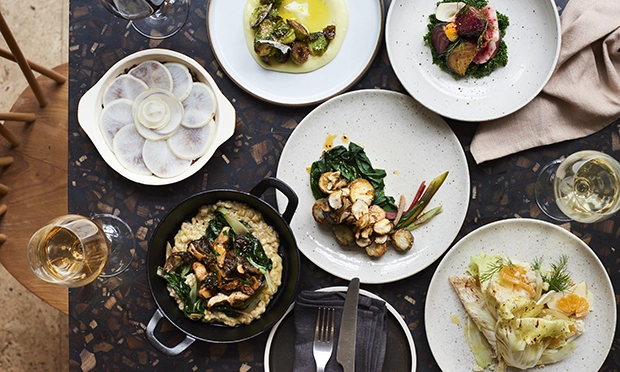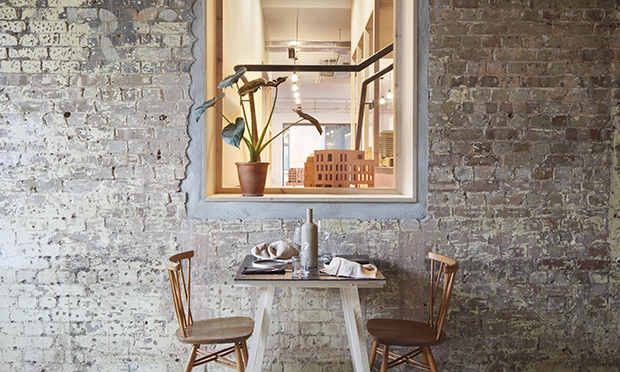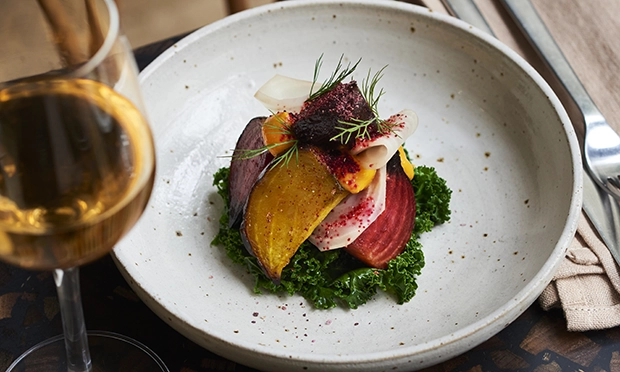Edit, Mare Street, food review: ‘A stylish step in the right direction’

A selection of dishes from Edit. Photograph: courtesy Edit
Mare Street has long been a boardwalk of cool new dinner spots – including a couple I’ve reviewed in the last few months.
But an architect-cum-restaurateur opening a vegan fine dining experience in an old factory building – now that, my friend, is cool.
Edit founder Elly Ward’s passion for the planet isn’t just a passing breeze. She has pinched two of the plant-based world’s best chefs, Fabrice Jacquet and Beth Olivier – both from The Gate in Islington.
The Gate, by the way, is a lifesaver whenever my mother blusters into town demanding culture and painless cuisine.
This pair bring the culinary skills, while Ward brings something rather unique: a soupçon of theatricality.
The space is eclectic and arresting, a long oblong stretching back from the pretty innocuous entrance. Red vinyl floors reference the industrial heritage and iron columns are still standing strong.
A mushroom wash and witchery chairs remind you of the ethics of the venture, and the recycled tables are so new that you get a light dusting of sawdust on your knees.

A glimpse through the window into a fascinating architectural wonderland. Photograph: courtesy Edit
But it’s the journey to the toilet that’s the real… trip. A sliding glass door opens and suddenly you’re in an architect’s studio, with mini model houses below you.
I worry for a second that some magic had slipped into my mushroom risotto as I gazed down on the tiny town like an overdressed giant.
I’m told that this area is under construction and I’m pointed to a spanking new toilet with wonky red tiles and Aesop soap.
What a glorious shot of oddness it was though. So different from the copper lampshades and bleach bone-like wood that seem to decorate the rest of the city’s new eateries.
Right, I am rambling and need to edit myself (sorry). The restaurant’s name refers to “the art of altering elements to improve the whole”.
The challenge of opening any venue in the wastes of late January is nothing short of terrifying, but the room is filled with folks in geometric patterns and loud earrings. Build it and they will come indeed.
Drinks? Drinks! I am a sucker for a martini, finding the perfumed bolt of booze an almost religious experience.
When I spy a house pickle martini, I almost leap for joy. A cheeky little nipper of a drink, vaguely green and definitely dangerous. This prophet of a concoction makes up for the rhubarb mimosa, which is like pouring prosecco into a warm and off-puttingly thick hard seltzer.
But what should you eat? So glad you asked. Utilizing the in-house bakery (though who knows where they fit it), we plump for the daily edit tasting menu, and the first course wafts its carby scent towards us.
Creamy flava bean hummus is despoiled by our searching fingers and hunks of light focaccia and dark walnut rye bread. Still warm, ripped apart easily, and drowned in leek-top oil.
Apple coleslaw is a fresher take on the Dutch classic and brightens up the whole affair. Pink radicchio looks like the insides of a sea creature’s flimsy body (without any of the bloodiness) dotted with flecks of oozing blood orange and homemade almond feta. A salad course unlike any other.
Three pieces of calçots (a Spanish sweet, green onion) are delicately cooked sitting like green crowns on the vermilion piles of catalán sauce. Warming seasonal goodness with a sauce like romesco but with an alternative chilli addition for heat.

The beetroot dish is ‘truly gratifying’. Photograph: courtesy Edit
Unmissable is the beetroot three-ways. Everyone loves a threesome (of vegetables, you dirty thing) and this roasted, fermented, dehydrated and god knows what else – stuffed? Caressed? Loved? – proves confidently that you don’t need meat to craft something truly gratifying.
The salsify and garlic aioli is another winner. Like a slightly sweet parsnip, these small tubes look like paccheri arranged like anti-tank spikes on a splurge of white sauce. Imagine stale chips with a salty wash – a fun and silly way to present a little-known vegetable. Are we satisfied with salsify? I certainly was.
A winter tomato sits like a fairy ring of leaves and Black Iberico halves with blobs of vegan mozzarella made from sunflower seeds. Nut-free, so it’s great for your allergic friend (although a nut allergy and veganism would be a death knell for any of my friendships). Sunzzarella (my name not there’s) certainly looks the part even if the taste is a distant echo of the proud dairy product.
But what doesn’t work? Exploring the drink options, there are three sustainable wines on tap. We sample a rather abrasive white Bordeaux by Barton & Joyeux that gives a lip-curling reaction. At £20 for 500ml (two glasses for those without a drinking problem), this “house” option is unsurprisingly wallet-wearing.
There is toast lager (made from…you guessed it old bread) and the already mentioned cocktails. The last of these is the very British negroni. What’s British about it is not its xenophobic outlook (a bit of Brexit humour) but a London-based vermouth. Unfortunately, its birth in our polluted skies has produced an overly biting variation.
The wild mushroom risotto is dispiriting but maybe that’s just down to my dislike for this dullest of dishes. Even the use of foraged hedgehog and chanterelle mushrooms can’t save it.
A sweet muscat wine from the Rhone valley goes down in a glide and prepares us for the sweets, and boy do we need preparation.
Things take a turn here. A charming evening of dainty morsels, minimal intervention, pretty pops of colour is somewhat abandoned for the desserts. Looking back, I wish we’d opted for the vegan cheese board.
The chocolate mousse with hazelnuts looks like an uncooked cake in a mug, with gritty bits like tadpoles in a swamp that must be the hazelnut shards. Chocolatey? Yes. Enjoyable? No.
Following this up is a rhubarb crumble (the left-over juice of which provides the base for the disappointing mimosa that harried us a few paragraphs above – all very root-to-fruit.
This crumble is a bitter dessert that seems unhappy, and isn’t the end of the meal meant to be a celebration? Squat and deflated, it’s hardly the crescendo we were hoping for.
As I pick the chocolate gravel from my teeth on the long ride home, I ruminate on the experience.
A tasting menu for £55 per person is certainly expensive, particularly during a cost-of-living crisis, but not altogether unreasonable for the amount you get. À la carte dishes is also available for those who don’t want the full shebang.
The fact that this is all bloodless (ignoring the orange) and restorative is a stylish step in the right direction. Everything in the space and on the menu is vegan, hyper-seasonal, reused, recycled, and local.
Underlining their dedication to the popular but difficult-to-achieve ethos of sustainability, Edit is commendably taking on the fine dining world and questioning whether it needs to be quite so exploitative.
The evening is a tribute to the natural world and green unfurling things. There is ingenuity and buckets of culinary knowhow on show, and I hope Ward, Jacquet, and Olivier successfully refine their offering while maintaining the restaurant’s blast of individuality.
Oh, and some better sweets please? Winter is hard, throw us a sticky toffee pudding or something.
Find out more at edit.london.
